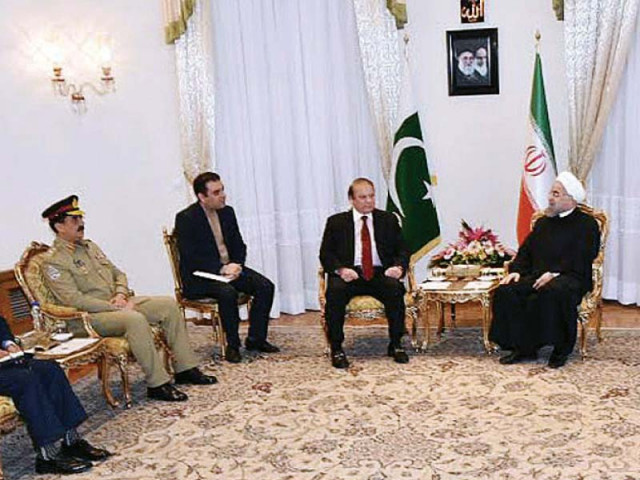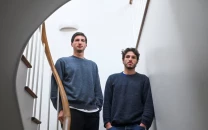Defusing tensions: PM upbeat about Saudi, Iran fence mending
Nawaz says both countries responded ‘positively’ to Pakistan’s mediation

Iran President Hassan Rowhani talks with PM Nawaz and army chief Gen Raheel. PHOTO: INP
Prime Minister Nawaz Sharif has said both Saudi Arabia and Iran have responded ‘positively’ to Pakistan’s mediation offer as he proposed a series of measures, including appointment of ‘focal persons’ by three countries, to defuse tensions between the two key Muslim countries.
Accompanied by army chief General Raheel Sharif and his foreign policy aide Tariq Fatemi, the prime minister flew into Tehran from Riyadh on Tuesday as part of a diplomatic effort to de-escalate tensions between the two countries.
Pakistan to name focal person for resolving Saudi-Iran conflict
Saudi Arabia and Iran have been engaged in a verbal duel since the January 2 execution of leading Shia cleric Sheikh Nimr al Nimr by the Saudis. The execution sparked violent protests in Iran where protesters stormed the Saudi diplomatic missions, leading to cessation of diplomatic relations between them.
Pakistan has since been trying to avoid taking sides and instead mounted a diplomatic initiative to reconcile the two countries with whom it has good friendly relations.
On Monday, Premier Nawaz and Gen Raheel held talks with Saudi King Salman bin Abdulaziz while on Tuesday the high-powered Pakistani delegation met with Iranian President Hassan Rouhani and his cabinet members to discuss the current situation in the Middle East, particularly the Saudi-Iran rift. The prime minister told reporters that it was Pakistan’s own initiative to mediate between the two countries. “Pakistan considers defusing tensions between Saudi Arabia and Iran as a scared mission,” he said, adding that both the countries responded positively to ‘our mediation’.
He said Pakistan would appoint a focal person to carry forward discussions. “Iran has also agreed to appoint its focal person while Saudi Arabia will be requested to do the same.”
Nawaz recalled that in the past too Pakistan had played a role in defusing tensions between the two countries while referring to the icebreaking meeting between late Saudi King Abdullah and then Iranian president Hashmi Rafsanjani in 1997 in Islamabad on the sidelines of an OIC conference.
PM Nawaz, army chief head to Saudi, Iran to mend rift
“We think it is our duty to make efforts for unity among all Muslim countries. I am satisfied with my discussions with both Saudi and Iranian leaders,” he said.
He said while the two countries might have reservations against each other, the encouraging sign is Saudi Arabia and Iran did not consider each other as enemy. “Both Saudi Arabia and Iran have shared their concerns, which cannot be made public,” he said, adding that he hoped the two countries would start talking to each other after his recent visit.
Nawaz said there should be collective efforts against the menace of militancy to eliminate it. “Extremism and terrorism have become a challenge and there is a need to adopt a joint strategy against them,” he said.
Premier Nawaz said Iran and Saudi Arab agreed Pakistan has vast experience of coping with terrorism and expressed their resolve to benefit from Islamabad. “Both countries also acknowledged the sacrifices Pakistan has rendered while fighting terrorism.”
Commenting on Premier Nawaz’s statement, an Iranian official website quoted President Rouhani as saying: “We want expansion of ties and do not welcome tensions on the condition that Muslim rights be respected and nations of the region be honoured and diplomatic frameworks be observed.”
He said Iran welcomes expansion of stability and security in Pakistan and added that historical backgrounds of mutual cooperation indicated that the two countries have had useful efforts in creation of stability and security in the region.
Following talks in Riyadh and Tehran, official sources revealed that the prime minister proposed to host a meeting between the leaders of Saudi Arabia and Iran in Islamabad.
Pakistan is believed to be making efforts to arrange the meeting during the upcoming visit of the Iranian president to Islamabad. Sources said the Iranian president accepted the proposal but the response from Saudi Arabia is awaited.
Gen Raheel allays fears on 34-national coalition
Official sources said the army chief General Raheel, in separate meetings with the Iranian defence minister and national security adviser, attempted to allay Tehran’s fears about Pakistan’s participation in the Saudi-led military coalition of 34 Islamic countries.
Islamabad has backed the Saudi initiative against terrorism, although, the scope of its participation in the coalition is yet to be decided. The Saudi initiative, however, is viewed with suspicion in Iran given the volatile situation in the Middle East. Official said Gen Raheel assured the top Iranian officials that Pakistan joined the coalition because it was meant to fight terrorist groups such Islamic State or Da’ish. He made it clear that the coalition was not against any specific country.
The Inter-Services Public Relations (ISPR) said during meeting with the Iranian defence minister, the army chief remarked, “Pakistan takes Iran as very important neighbouring country and people of Pakistan have a great affinity with our Iranian brothers.”
He said terrorism was a global challenge, which according to him, has the potential of destabilising the region. This situation, he emphasised, needed a coordinated response.
The Iranian defence minister thanked Gen Raheel and people of Pakistan for their efforts towards stabilising the region, the ISPR statement added.
Pakistan offers to defuse Saudi-Iran tensions
During the meeting with Supreme National Security Council Secretary Ali Shamkhani, who is also military adviser to Iran’s supreme leader Ayatollah Ali Khamenai, the army chief said regional security and stability was paramount and stressed the need for opening up of communication channels between Iran and Saudi Arabia.
“To counter emerging threats, greater Muslim unity is need of the hour. Menace of terrorism can only be addressed through coordinated response.”
Published in The Express Tribune, January 20th, 2016.


















COMMENTS
Comments are moderated and generally will be posted if they are on-topic and not abusive.
For more information, please see our Comments FAQ